Analysis of Factors Impeding Evidence-Based Practice in Nursing
VerifiedAdded on 2022/11/14
|15
|4104
|377
Essay
AI Summary
This essay delves into the concept of evidence-based practice (EBP) and its application within nursing, emphasizing its role in informing clinical decisions for optimal patient care. It defines EBP as a problem-solving approach utilizing the latest research findings, clinical expertise, and patient preferences to enhance safety, reduce healthcare costs, and improve patient outcomes. The essay explores the significance of EBP in improving nurses' performance and professional development, while also addressing the barriers that impede its implementation, including institutional issues, lack of motivation, knowledge gaps, technology limitations, patient and physician factors, and time constraints. A comprehensive literature review supports these factors, with the essay providing recommendations for nurses to overcome these challenges and integrate EBP effectively, thereby enhancing their practice and improving patient care. The essay also highlights the importance of education, organizational support, and updated technology to facilitate the successful implementation of evidence-based practice in nursing.
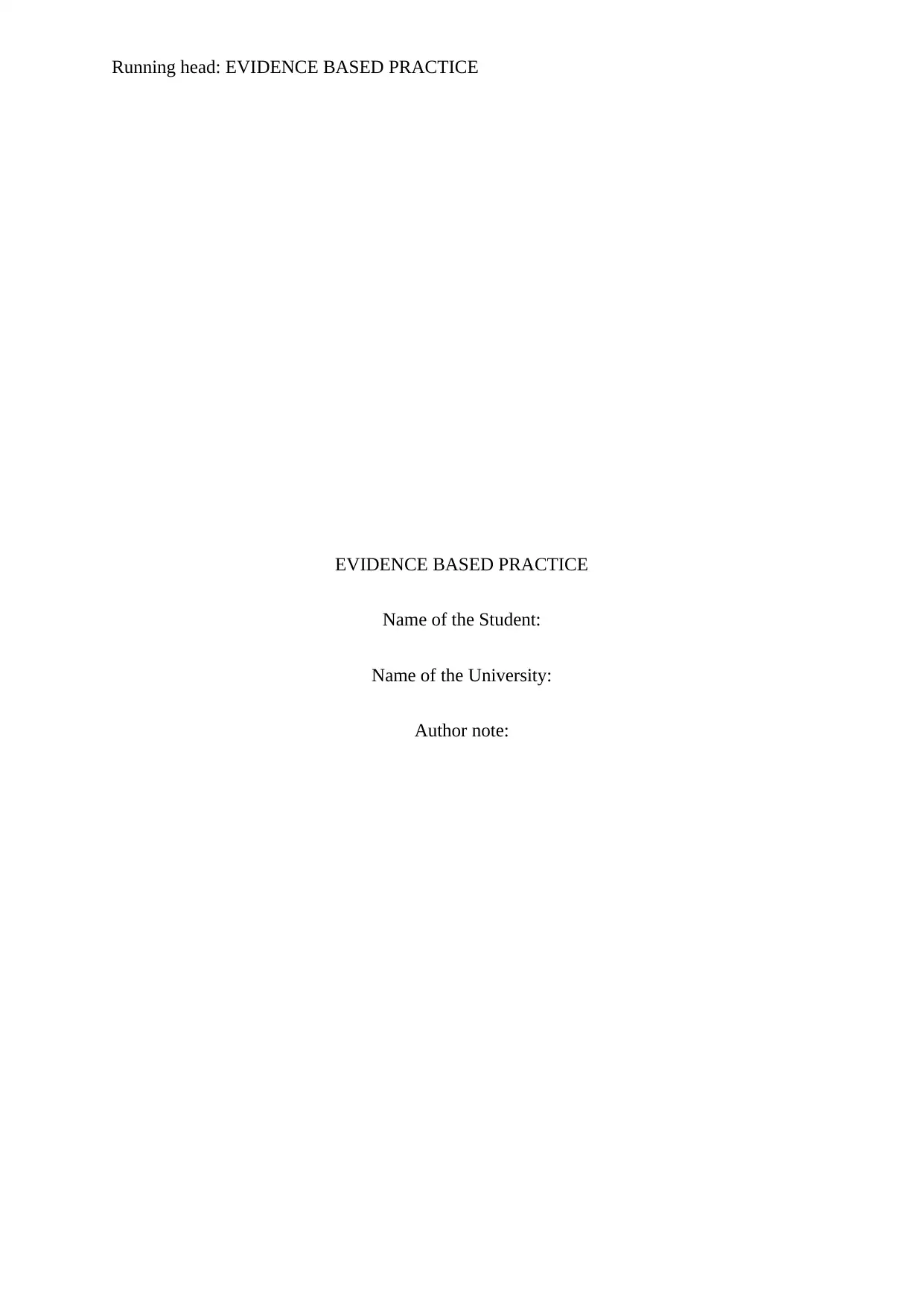
Running head: EVIDENCE BASED PRACTICE
EVIDENCE BASED PRACTICE
Name of the Student:
Name of the University:
Author note:
EVIDENCE BASED PRACTICE
Name of the Student:
Name of the University:
Author note:
Paraphrase This Document
Need a fresh take? Get an instant paraphrase of this document with our AI Paraphraser
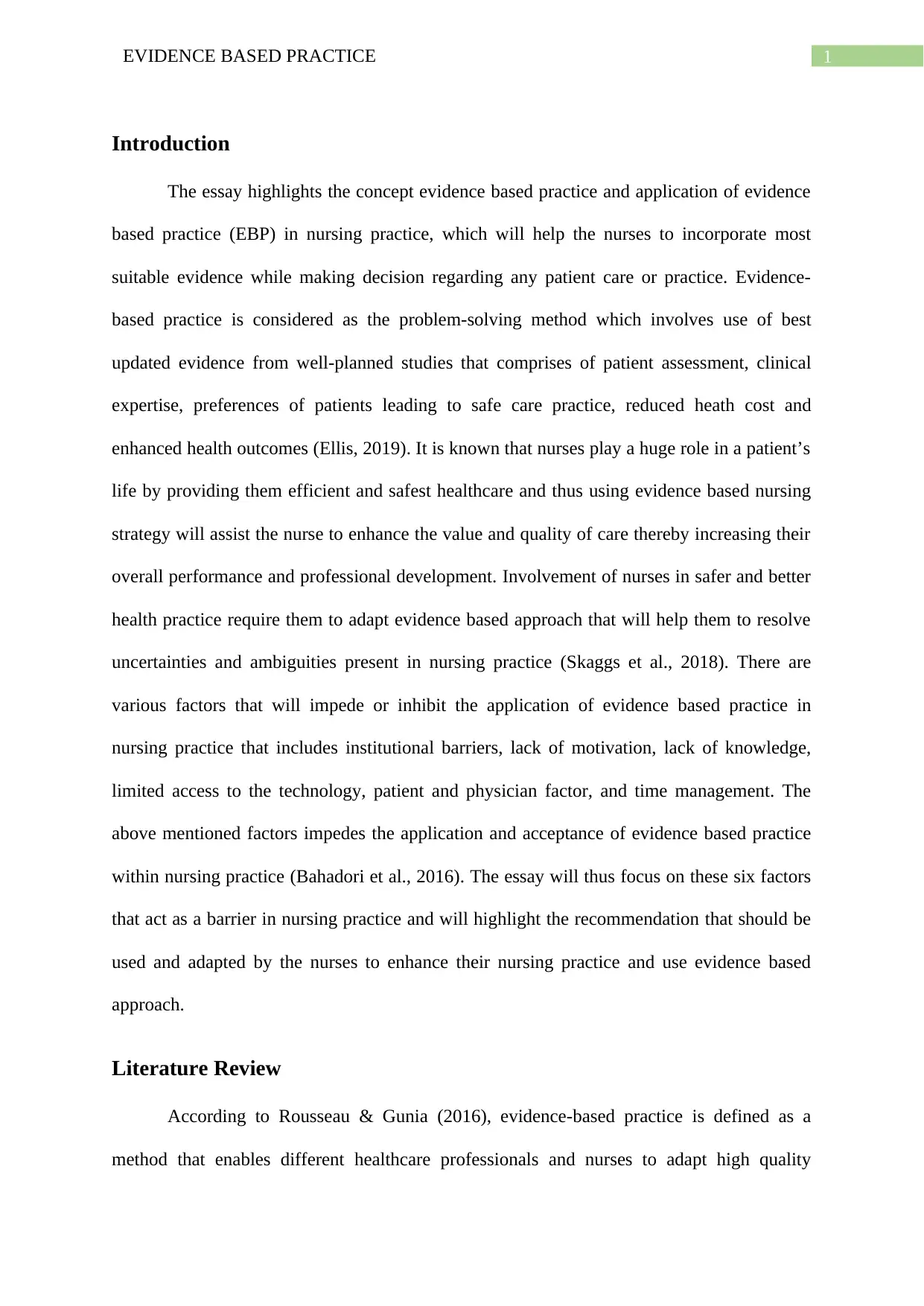
1EVIDENCE BASED PRACTICE
Introduction
The essay highlights the concept evidence based practice and application of evidence
based practice (EBP) in nursing practice, which will help the nurses to incorporate most
suitable evidence while making decision regarding any patient care or practice. Evidence-
based practice is considered as the problem-solving method which involves use of best
updated evidence from well-planned studies that comprises of patient assessment, clinical
expertise, preferences of patients leading to safe care practice, reduced heath cost and
enhanced health outcomes (Ellis, 2019). It is known that nurses play a huge role in a patient’s
life by providing them efficient and safest healthcare and thus using evidence based nursing
strategy will assist the nurse to enhance the value and quality of care thereby increasing their
overall performance and professional development. Involvement of nurses in safer and better
health practice require them to adapt evidence based approach that will help them to resolve
uncertainties and ambiguities present in nursing practice (Skaggs et al., 2018). There are
various factors that will impede or inhibit the application of evidence based practice in
nursing practice that includes institutional barriers, lack of motivation, lack of knowledge,
limited access to the technology, patient and physician factor, and time management. The
above mentioned factors impedes the application and acceptance of evidence based practice
within nursing practice (Bahadori et al., 2016). The essay will thus focus on these six factors
that act as a barrier in nursing practice and will highlight the recommendation that should be
used and adapted by the nurses to enhance their nursing practice and use evidence based
approach.
Literature Review
According to Rousseau & Gunia (2016), evidence-based practice is defined as a
method that enables different healthcare professionals and nurses to adapt high quality
Introduction
The essay highlights the concept evidence based practice and application of evidence
based practice (EBP) in nursing practice, which will help the nurses to incorporate most
suitable evidence while making decision regarding any patient care or practice. Evidence-
based practice is considered as the problem-solving method which involves use of best
updated evidence from well-planned studies that comprises of patient assessment, clinical
expertise, preferences of patients leading to safe care practice, reduced heath cost and
enhanced health outcomes (Ellis, 2019). It is known that nurses play a huge role in a patient’s
life by providing them efficient and safest healthcare and thus using evidence based nursing
strategy will assist the nurse to enhance the value and quality of care thereby increasing their
overall performance and professional development. Involvement of nurses in safer and better
health practice require them to adapt evidence based approach that will help them to resolve
uncertainties and ambiguities present in nursing practice (Skaggs et al., 2018). There are
various factors that will impede or inhibit the application of evidence based practice in
nursing practice that includes institutional barriers, lack of motivation, lack of knowledge,
limited access to the technology, patient and physician factor, and time management. The
above mentioned factors impedes the application and acceptance of evidence based practice
within nursing practice (Bahadori et al., 2016). The essay will thus focus on these six factors
that act as a barrier in nursing practice and will highlight the recommendation that should be
used and adapted by the nurses to enhance their nursing practice and use evidence based
approach.
Literature Review
According to Rousseau & Gunia (2016), evidence-based practice is defined as a
method that enables different healthcare professionals and nurses to adapt high quality
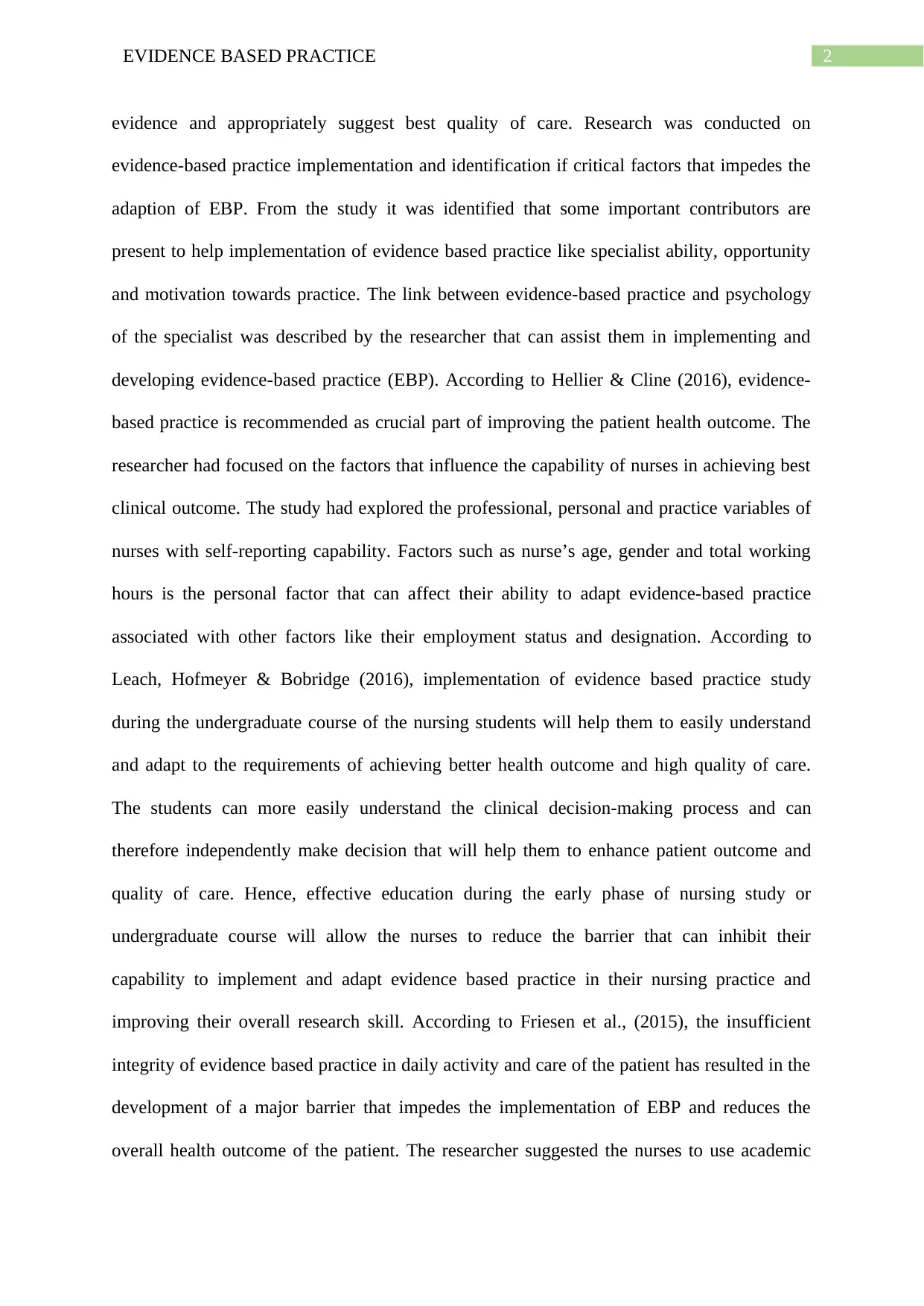
2EVIDENCE BASED PRACTICE
evidence and appropriately suggest best quality of care. Research was conducted on
evidence-based practice implementation and identification if critical factors that impedes the
adaption of EBP. From the study it was identified that some important contributors are
present to help implementation of evidence based practice like specialist ability, opportunity
and motivation towards practice. The link between evidence-based practice and psychology
of the specialist was described by the researcher that can assist them in implementing and
developing evidence-based practice (EBP). According to Hellier & Cline (2016), evidence-
based practice is recommended as crucial part of improving the patient health outcome. The
researcher had focused on the factors that influence the capability of nurses in achieving best
clinical outcome. The study had explored the professional, personal and practice variables of
nurses with self-reporting capability. Factors such as nurse’s age, gender and total working
hours is the personal factor that can affect their ability to adapt evidence-based practice
associated with other factors like their employment status and designation. According to
Leach, Hofmeyer & Bobridge (2016), implementation of evidence based practice study
during the undergraduate course of the nursing students will help them to easily understand
and adapt to the requirements of achieving better health outcome and high quality of care.
The students can more easily understand the clinical decision-making process and can
therefore independently make decision that will help them to enhance patient outcome and
quality of care. Hence, effective education during the early phase of nursing study or
undergraduate course will allow the nurses to reduce the barrier that can inhibit their
capability to implement and adapt evidence based practice in their nursing practice and
improving their overall research skill. According to Friesen et al., (2015), the insufficient
integrity of evidence based practice in daily activity and care of the patient has resulted in the
development of a major barrier that impedes the implementation of EBP and reduces the
overall health outcome of the patient. The researcher suggested the nurses to use academic
evidence and appropriately suggest best quality of care. Research was conducted on
evidence-based practice implementation and identification if critical factors that impedes the
adaption of EBP. From the study it was identified that some important contributors are
present to help implementation of evidence based practice like specialist ability, opportunity
and motivation towards practice. The link between evidence-based practice and psychology
of the specialist was described by the researcher that can assist them in implementing and
developing evidence-based practice (EBP). According to Hellier & Cline (2016), evidence-
based practice is recommended as crucial part of improving the patient health outcome. The
researcher had focused on the factors that influence the capability of nurses in achieving best
clinical outcome. The study had explored the professional, personal and practice variables of
nurses with self-reporting capability. Factors such as nurse’s age, gender and total working
hours is the personal factor that can affect their ability to adapt evidence-based practice
associated with other factors like their employment status and designation. According to
Leach, Hofmeyer & Bobridge (2016), implementation of evidence based practice study
during the undergraduate course of the nursing students will help them to easily understand
and adapt to the requirements of achieving better health outcome and high quality of care.
The students can more easily understand the clinical decision-making process and can
therefore independently make decision that will help them to enhance patient outcome and
quality of care. Hence, effective education during the early phase of nursing study or
undergraduate course will allow the nurses to reduce the barrier that can inhibit their
capability to implement and adapt evidence based practice in their nursing practice and
improving their overall research skill. According to Friesen et al., (2015), the insufficient
integrity of evidence based practice in daily activity and care of the patient has resulted in the
development of a major barrier that impedes the implementation of EBP and reduces the
overall health outcome of the patient. The researcher suggested the nurses to use academic
⊘ This is a preview!⊘
Do you want full access?
Subscribe today to unlock all pages.

Trusted by 1+ million students worldwide
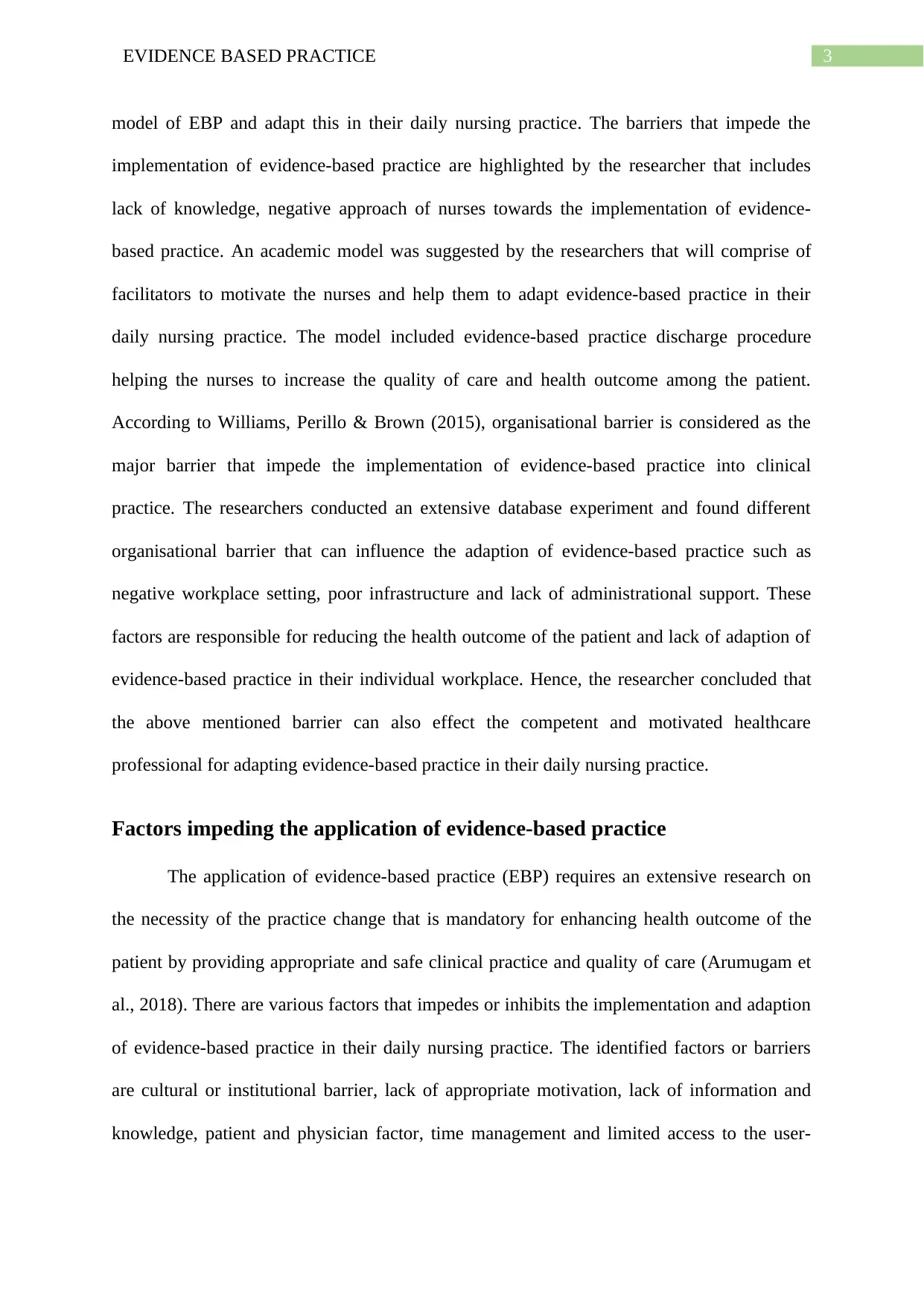
3EVIDENCE BASED PRACTICE
model of EBP and adapt this in their daily nursing practice. The barriers that impede the
implementation of evidence-based practice are highlighted by the researcher that includes
lack of knowledge, negative approach of nurses towards the implementation of evidence-
based practice. An academic model was suggested by the researchers that will comprise of
facilitators to motivate the nurses and help them to adapt evidence-based practice in their
daily nursing practice. The model included evidence-based practice discharge procedure
helping the nurses to increase the quality of care and health outcome among the patient.
According to Williams, Perillo & Brown (2015), organisational barrier is considered as the
major barrier that impede the implementation of evidence-based practice into clinical
practice. The researchers conducted an extensive database experiment and found different
organisational barrier that can influence the adaption of evidence-based practice such as
negative workplace setting, poor infrastructure and lack of administrational support. These
factors are responsible for reducing the health outcome of the patient and lack of adaption of
evidence-based practice in their individual workplace. Hence, the researcher concluded that
the above mentioned barrier can also effect the competent and motivated healthcare
professional for adapting evidence-based practice in their daily nursing practice.
Factors impeding the application of evidence-based practice
The application of evidence-based practice (EBP) requires an extensive research on
the necessity of the practice change that is mandatory for enhancing health outcome of the
patient by providing appropriate and safe clinical practice and quality of care (Arumugam et
al., 2018). There are various factors that impedes or inhibits the implementation and adaption
of evidence-based practice in their daily nursing practice. The identified factors or barriers
are cultural or institutional barrier, lack of appropriate motivation, lack of information and
knowledge, patient and physician factor, time management and limited access to the user-
model of EBP and adapt this in their daily nursing practice. The barriers that impede the
implementation of evidence-based practice are highlighted by the researcher that includes
lack of knowledge, negative approach of nurses towards the implementation of evidence-
based practice. An academic model was suggested by the researchers that will comprise of
facilitators to motivate the nurses and help them to adapt evidence-based practice in their
daily nursing practice. The model included evidence-based practice discharge procedure
helping the nurses to increase the quality of care and health outcome among the patient.
According to Williams, Perillo & Brown (2015), organisational barrier is considered as the
major barrier that impede the implementation of evidence-based practice into clinical
practice. The researchers conducted an extensive database experiment and found different
organisational barrier that can influence the adaption of evidence-based practice such as
negative workplace setting, poor infrastructure and lack of administrational support. These
factors are responsible for reducing the health outcome of the patient and lack of adaption of
evidence-based practice in their individual workplace. Hence, the researcher concluded that
the above mentioned barrier can also effect the competent and motivated healthcare
professional for adapting evidence-based practice in their daily nursing practice.
Factors impeding the application of evidence-based practice
The application of evidence-based practice (EBP) requires an extensive research on
the necessity of the practice change that is mandatory for enhancing health outcome of the
patient by providing appropriate and safe clinical practice and quality of care (Arumugam et
al., 2018). There are various factors that impedes or inhibits the implementation and adaption
of evidence-based practice in their daily nursing practice. The identified factors or barriers
are cultural or institutional barrier, lack of appropriate motivation, lack of information and
knowledge, patient and physician factor, time management and limited access to the user-
Paraphrase This Document
Need a fresh take? Get an instant paraphrase of this document with our AI Paraphraser
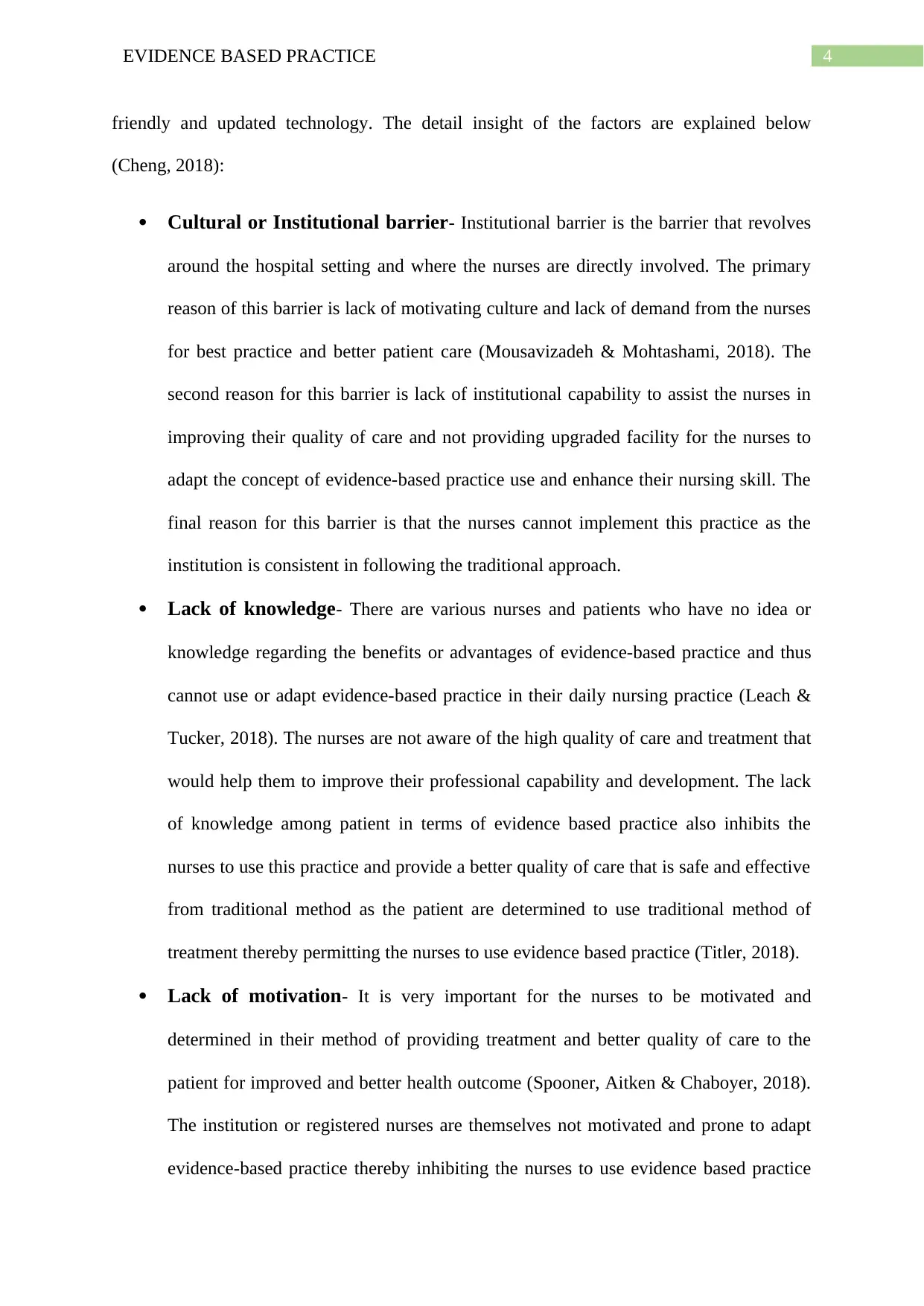
4EVIDENCE BASED PRACTICE
friendly and updated technology. The detail insight of the factors are explained below
(Cheng, 2018):
Cultural or Institutional barrier- Institutional barrier is the barrier that revolves
around the hospital setting and where the nurses are directly involved. The primary
reason of this barrier is lack of motivating culture and lack of demand from the nurses
for best practice and better patient care (Mousavizadeh & Mohtashami, 2018). The
second reason for this barrier is lack of institutional capability to assist the nurses in
improving their quality of care and not providing upgraded facility for the nurses to
adapt the concept of evidence-based practice use and enhance their nursing skill. The
final reason for this barrier is that the nurses cannot implement this practice as the
institution is consistent in following the traditional approach.
Lack of knowledge- There are various nurses and patients who have no idea or
knowledge regarding the benefits or advantages of evidence-based practice and thus
cannot use or adapt evidence-based practice in their daily nursing practice (Leach &
Tucker, 2018). The nurses are not aware of the high quality of care and treatment that
would help them to improve their professional capability and development. The lack
of knowledge among patient in terms of evidence based practice also inhibits the
nurses to use this practice and provide a better quality of care that is safe and effective
from traditional method as the patient are determined to use traditional method of
treatment thereby permitting the nurses to use evidence based practice (Titler, 2018).
Lack of motivation- It is very important for the nurses to be motivated and
determined in their method of providing treatment and better quality of care to the
patient for improved and better health outcome (Spooner, Aitken & Chaboyer, 2018).
The institution or registered nurses are themselves not motivated and prone to adapt
evidence-based practice thereby inhibiting the nurses to use evidence based practice
friendly and updated technology. The detail insight of the factors are explained below
(Cheng, 2018):
Cultural or Institutional barrier- Institutional barrier is the barrier that revolves
around the hospital setting and where the nurses are directly involved. The primary
reason of this barrier is lack of motivating culture and lack of demand from the nurses
for best practice and better patient care (Mousavizadeh & Mohtashami, 2018). The
second reason for this barrier is lack of institutional capability to assist the nurses in
improving their quality of care and not providing upgraded facility for the nurses to
adapt the concept of evidence-based practice use and enhance their nursing skill. The
final reason for this barrier is that the nurses cannot implement this practice as the
institution is consistent in following the traditional approach.
Lack of knowledge- There are various nurses and patients who have no idea or
knowledge regarding the benefits or advantages of evidence-based practice and thus
cannot use or adapt evidence-based practice in their daily nursing practice (Leach &
Tucker, 2018). The nurses are not aware of the high quality of care and treatment that
would help them to improve their professional capability and development. The lack
of knowledge among patient in terms of evidence based practice also inhibits the
nurses to use this practice and provide a better quality of care that is safe and effective
from traditional method as the patient are determined to use traditional method of
treatment thereby permitting the nurses to use evidence based practice (Titler, 2018).
Lack of motivation- It is very important for the nurses to be motivated and
determined in their method of providing treatment and better quality of care to the
patient for improved and better health outcome (Spooner, Aitken & Chaboyer, 2018).
The institution or registered nurses are themselves not motivated and prone to adapt
evidence-based practice thereby inhibiting the nurses to use evidence based practice
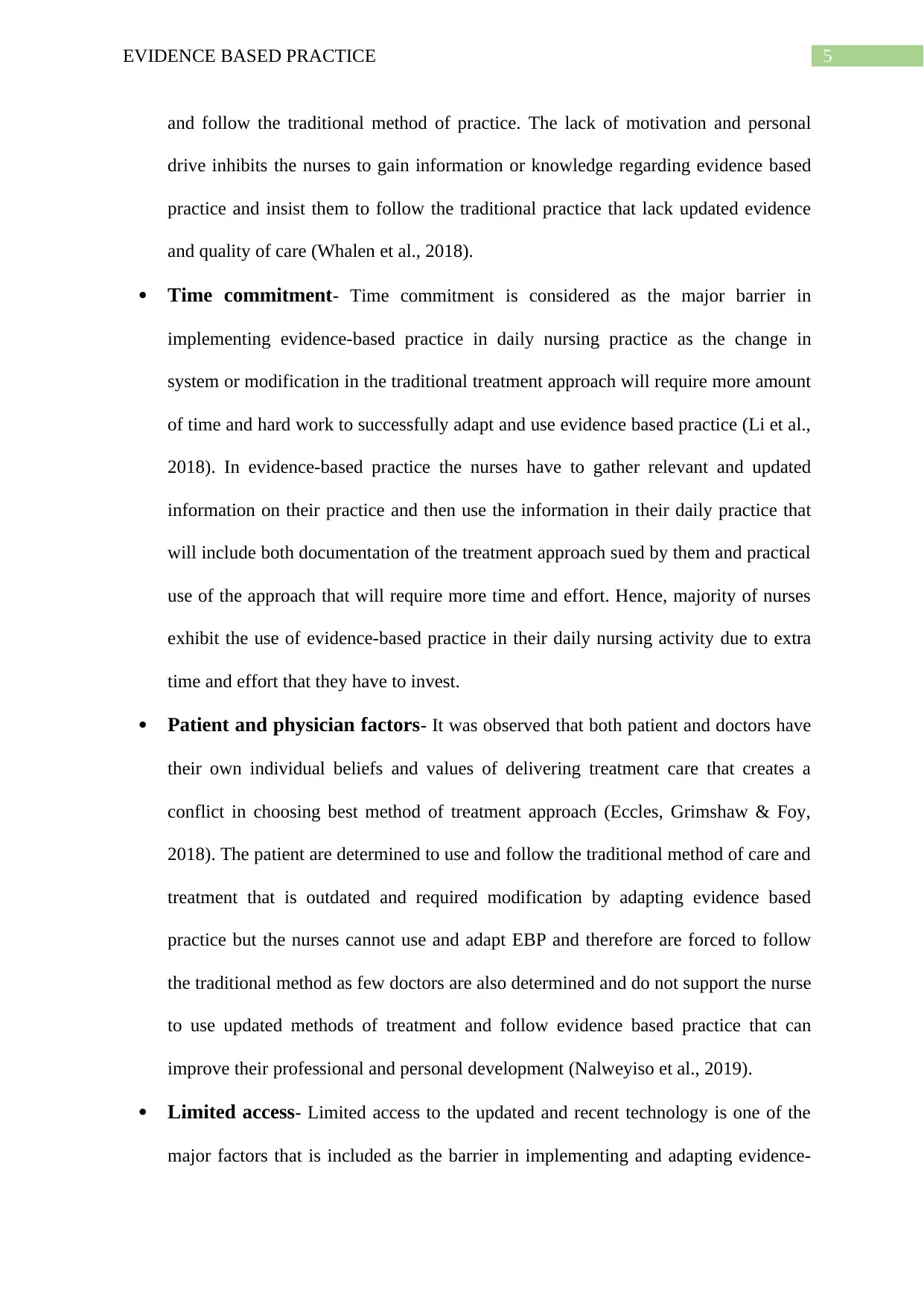
5EVIDENCE BASED PRACTICE
and follow the traditional method of practice. The lack of motivation and personal
drive inhibits the nurses to gain information or knowledge regarding evidence based
practice and insist them to follow the traditional practice that lack updated evidence
and quality of care (Whalen et al., 2018).
Time commitment- Time commitment is considered as the major barrier in
implementing evidence-based practice in daily nursing practice as the change in
system or modification in the traditional treatment approach will require more amount
of time and hard work to successfully adapt and use evidence based practice (Li et al.,
2018). In evidence-based practice the nurses have to gather relevant and updated
information on their practice and then use the information in their daily practice that
will include both documentation of the treatment approach sued by them and practical
use of the approach that will require more time and effort. Hence, majority of nurses
exhibit the use of evidence-based practice in their daily nursing activity due to extra
time and effort that they have to invest.
Patient and physician factors- It was observed that both patient and doctors have
their own individual beliefs and values of delivering treatment care that creates a
conflict in choosing best method of treatment approach (Eccles, Grimshaw & Foy,
2018). The patient are determined to use and follow the traditional method of care and
treatment that is outdated and required modification by adapting evidence based
practice but the nurses cannot use and adapt EBP and therefore are forced to follow
the traditional method as few doctors are also determined and do not support the nurse
to use updated methods of treatment and follow evidence based practice that can
improve their professional and personal development (Nalweyiso et al., 2019).
Limited access- Limited access to the updated and recent technology is one of the
major factors that is included as the barrier in implementing and adapting evidence-
and follow the traditional method of practice. The lack of motivation and personal
drive inhibits the nurses to gain information or knowledge regarding evidence based
practice and insist them to follow the traditional practice that lack updated evidence
and quality of care (Whalen et al., 2018).
Time commitment- Time commitment is considered as the major barrier in
implementing evidence-based practice in daily nursing practice as the change in
system or modification in the traditional treatment approach will require more amount
of time and hard work to successfully adapt and use evidence based practice (Li et al.,
2018). In evidence-based practice the nurses have to gather relevant and updated
information on their practice and then use the information in their daily practice that
will include both documentation of the treatment approach sued by them and practical
use of the approach that will require more time and effort. Hence, majority of nurses
exhibit the use of evidence-based practice in their daily nursing activity due to extra
time and effort that they have to invest.
Patient and physician factors- It was observed that both patient and doctors have
their own individual beliefs and values of delivering treatment care that creates a
conflict in choosing best method of treatment approach (Eccles, Grimshaw & Foy,
2018). The patient are determined to use and follow the traditional method of care and
treatment that is outdated and required modification by adapting evidence based
practice but the nurses cannot use and adapt EBP and therefore are forced to follow
the traditional method as few doctors are also determined and do not support the nurse
to use updated methods of treatment and follow evidence based practice that can
improve their professional and personal development (Nalweyiso et al., 2019).
Limited access- Limited access to the updated and recent technology is one of the
major factors that is included as the barrier in implementing and adapting evidence-
⊘ This is a preview!⊘
Do you want full access?
Subscribe today to unlock all pages.

Trusted by 1+ million students worldwide
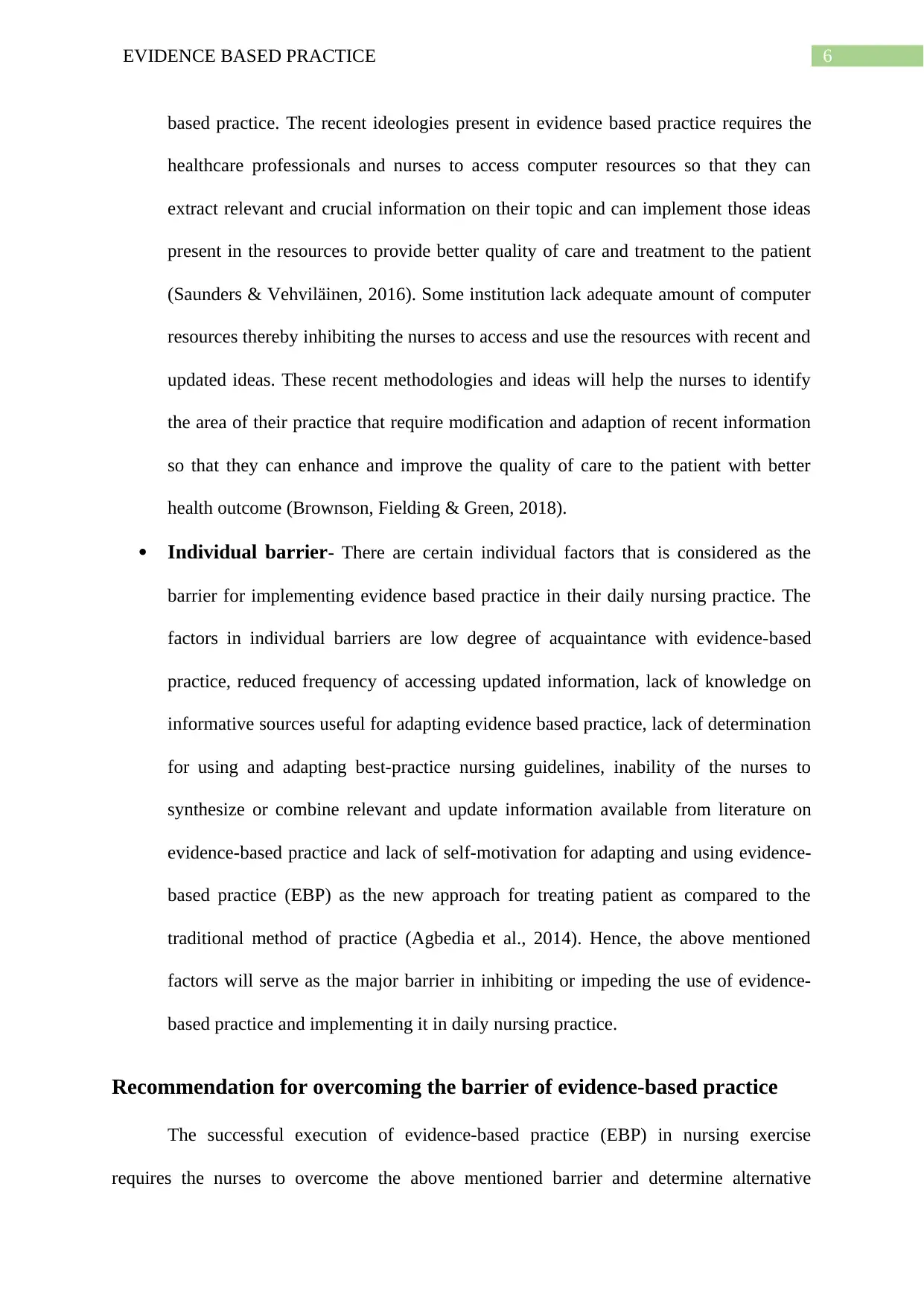
6EVIDENCE BASED PRACTICE
based practice. The recent ideologies present in evidence based practice requires the
healthcare professionals and nurses to access computer resources so that they can
extract relevant and crucial information on their topic and can implement those ideas
present in the resources to provide better quality of care and treatment to the patient
(Saunders & Vehviläinen, 2016). Some institution lack adequate amount of computer
resources thereby inhibiting the nurses to access and use the resources with recent and
updated ideas. These recent methodologies and ideas will help the nurses to identify
the area of their practice that require modification and adaption of recent information
so that they can enhance and improve the quality of care to the patient with better
health outcome (Brownson, Fielding & Green, 2018).
Individual barrier- There are certain individual factors that is considered as the
barrier for implementing evidence based practice in their daily nursing practice. The
factors in individual barriers are low degree of acquaintance with evidence-based
practice, reduced frequency of accessing updated information, lack of knowledge on
informative sources useful for adapting evidence based practice, lack of determination
for using and adapting best-practice nursing guidelines, inability of the nurses to
synthesize or combine relevant and update information available from literature on
evidence-based practice and lack of self-motivation for adapting and using evidence-
based practice (EBP) as the new approach for treating patient as compared to the
traditional method of practice (Agbedia et al., 2014). Hence, the above mentioned
factors will serve as the major barrier in inhibiting or impeding the use of evidence-
based practice and implementing it in daily nursing practice.
Recommendation for overcoming the barrier of evidence-based practice
The successful execution of evidence-based practice (EBP) in nursing exercise
requires the nurses to overcome the above mentioned barrier and determine alternative
based practice. The recent ideologies present in evidence based practice requires the
healthcare professionals and nurses to access computer resources so that they can
extract relevant and crucial information on their topic and can implement those ideas
present in the resources to provide better quality of care and treatment to the patient
(Saunders & Vehviläinen, 2016). Some institution lack adequate amount of computer
resources thereby inhibiting the nurses to access and use the resources with recent and
updated ideas. These recent methodologies and ideas will help the nurses to identify
the area of their practice that require modification and adaption of recent information
so that they can enhance and improve the quality of care to the patient with better
health outcome (Brownson, Fielding & Green, 2018).
Individual barrier- There are certain individual factors that is considered as the
barrier for implementing evidence based practice in their daily nursing practice. The
factors in individual barriers are low degree of acquaintance with evidence-based
practice, reduced frequency of accessing updated information, lack of knowledge on
informative sources useful for adapting evidence based practice, lack of determination
for using and adapting best-practice nursing guidelines, inability of the nurses to
synthesize or combine relevant and update information available from literature on
evidence-based practice and lack of self-motivation for adapting and using evidence-
based practice (EBP) as the new approach for treating patient as compared to the
traditional method of practice (Agbedia et al., 2014). Hence, the above mentioned
factors will serve as the major barrier in inhibiting or impeding the use of evidence-
based practice and implementing it in daily nursing practice.
Recommendation for overcoming the barrier of evidence-based practice
The successful execution of evidence-based practice (EBP) in nursing exercise
requires the nurses to overcome the above mentioned barrier and determine alternative
Paraphrase This Document
Need a fresh take? Get an instant paraphrase of this document with our AI Paraphraser
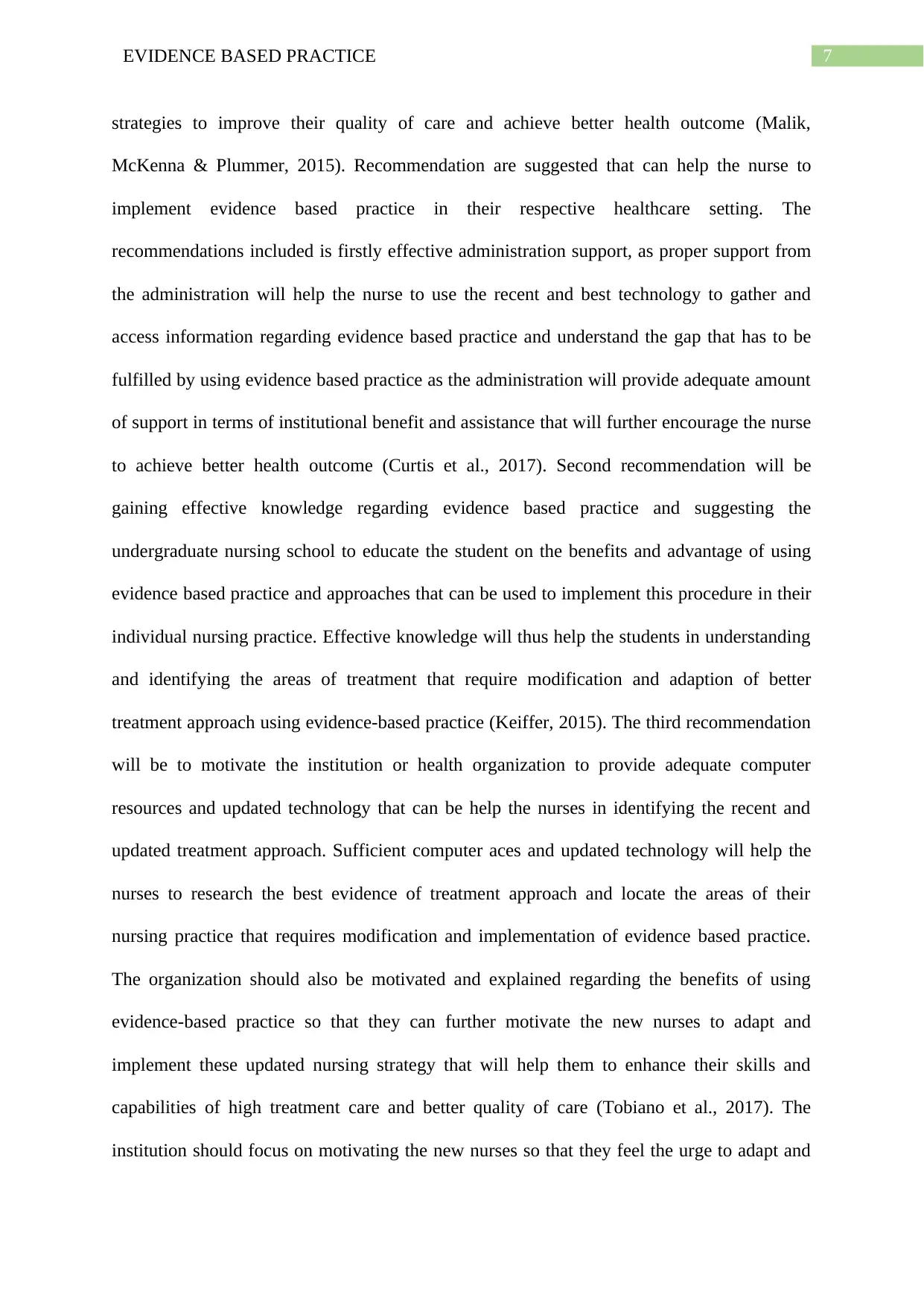
7EVIDENCE BASED PRACTICE
strategies to improve their quality of care and achieve better health outcome (Malik,
McKenna & Plummer, 2015). Recommendation are suggested that can help the nurse to
implement evidence based practice in their respective healthcare setting. The
recommendations included is firstly effective administration support, as proper support from
the administration will help the nurse to use the recent and best technology to gather and
access information regarding evidence based practice and understand the gap that has to be
fulfilled by using evidence based practice as the administration will provide adequate amount
of support in terms of institutional benefit and assistance that will further encourage the nurse
to achieve better health outcome (Curtis et al., 2017). Second recommendation will be
gaining effective knowledge regarding evidence based practice and suggesting the
undergraduate nursing school to educate the student on the benefits and advantage of using
evidence based practice and approaches that can be used to implement this procedure in their
individual nursing practice. Effective knowledge will thus help the students in understanding
and identifying the areas of treatment that require modification and adaption of better
treatment approach using evidence-based practice (Keiffer, 2015). The third recommendation
will be to motivate the institution or health organization to provide adequate computer
resources and updated technology that can be help the nurses in identifying the recent and
updated treatment approach. Sufficient computer aces and updated technology will help the
nurses to research the best evidence of treatment approach and locate the areas of their
nursing practice that requires modification and implementation of evidence based practice.
The organization should also be motivated and explained regarding the benefits of using
evidence-based practice so that they can further motivate the new nurses to adapt and
implement these updated nursing strategy that will help them to enhance their skills and
capabilities of high treatment care and better quality of care (Tobiano et al., 2017). The
institution should focus on motivating the new nurses so that they feel the urge to adapt and
strategies to improve their quality of care and achieve better health outcome (Malik,
McKenna & Plummer, 2015). Recommendation are suggested that can help the nurse to
implement evidence based practice in their respective healthcare setting. The
recommendations included is firstly effective administration support, as proper support from
the administration will help the nurse to use the recent and best technology to gather and
access information regarding evidence based practice and understand the gap that has to be
fulfilled by using evidence based practice as the administration will provide adequate amount
of support in terms of institutional benefit and assistance that will further encourage the nurse
to achieve better health outcome (Curtis et al., 2017). Second recommendation will be
gaining effective knowledge regarding evidence based practice and suggesting the
undergraduate nursing school to educate the student on the benefits and advantage of using
evidence based practice and approaches that can be used to implement this procedure in their
individual nursing practice. Effective knowledge will thus help the students in understanding
and identifying the areas of treatment that require modification and adaption of better
treatment approach using evidence-based practice (Keiffer, 2015). The third recommendation
will be to motivate the institution or health organization to provide adequate computer
resources and updated technology that can be help the nurses in identifying the recent and
updated treatment approach. Sufficient computer aces and updated technology will help the
nurses to research the best evidence of treatment approach and locate the areas of their
nursing practice that requires modification and implementation of evidence based practice.
The organization should also be motivated and explained regarding the benefits of using
evidence-based practice so that they can further motivate the new nurses to adapt and
implement these updated nursing strategy that will help them to enhance their skills and
capabilities of high treatment care and better quality of care (Tobiano et al., 2017). The
institution should focus on motivating the new nurses so that they feel the urge to adapt and
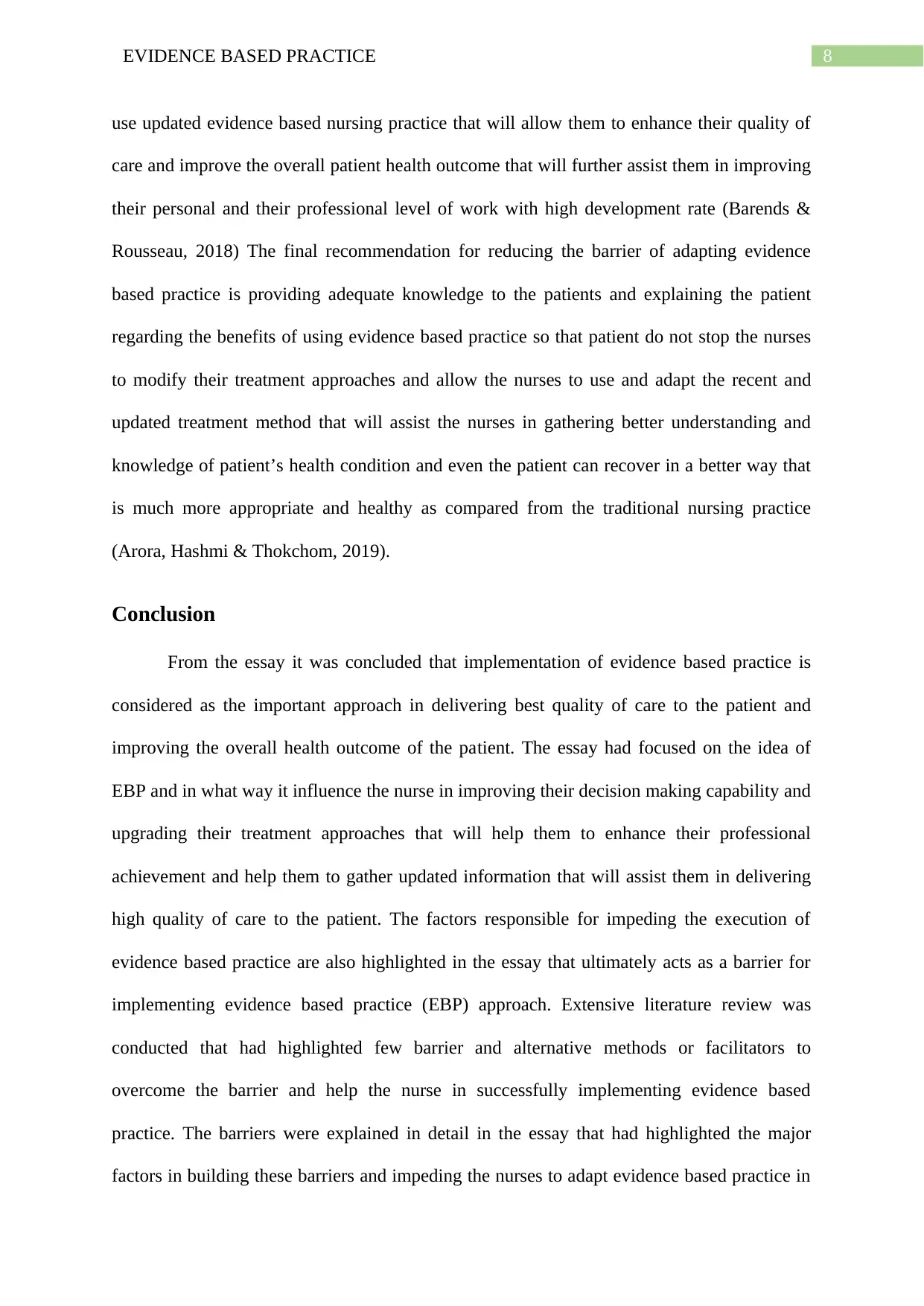
8EVIDENCE BASED PRACTICE
use updated evidence based nursing practice that will allow them to enhance their quality of
care and improve the overall patient health outcome that will further assist them in improving
their personal and their professional level of work with high development rate (Barends &
Rousseau, 2018) The final recommendation for reducing the barrier of adapting evidence
based practice is providing adequate knowledge to the patients and explaining the patient
regarding the benefits of using evidence based practice so that patient do not stop the nurses
to modify their treatment approaches and allow the nurses to use and adapt the recent and
updated treatment method that will assist the nurses in gathering better understanding and
knowledge of patient’s health condition and even the patient can recover in a better way that
is much more appropriate and healthy as compared from the traditional nursing practice
(Arora, Hashmi & Thokchom, 2019).
Conclusion
From the essay it was concluded that implementation of evidence based practice is
considered as the important approach in delivering best quality of care to the patient and
improving the overall health outcome of the patient. The essay had focused on the idea of
EBP and in what way it influence the nurse in improving their decision making capability and
upgrading their treatment approaches that will help them to enhance their professional
achievement and help them to gather updated information that will assist them in delivering
high quality of care to the patient. The factors responsible for impeding the execution of
evidence based practice are also highlighted in the essay that ultimately acts as a barrier for
implementing evidence based practice (EBP) approach. Extensive literature review was
conducted that had highlighted few barrier and alternative methods or facilitators to
overcome the barrier and help the nurse in successfully implementing evidence based
practice. The barriers were explained in detail in the essay that had highlighted the major
factors in building these barriers and impeding the nurses to adapt evidence based practice in
use updated evidence based nursing practice that will allow them to enhance their quality of
care and improve the overall patient health outcome that will further assist them in improving
their personal and their professional level of work with high development rate (Barends &
Rousseau, 2018) The final recommendation for reducing the barrier of adapting evidence
based practice is providing adequate knowledge to the patients and explaining the patient
regarding the benefits of using evidence based practice so that patient do not stop the nurses
to modify their treatment approaches and allow the nurses to use and adapt the recent and
updated treatment method that will assist the nurses in gathering better understanding and
knowledge of patient’s health condition and even the patient can recover in a better way that
is much more appropriate and healthy as compared from the traditional nursing practice
(Arora, Hashmi & Thokchom, 2019).
Conclusion
From the essay it was concluded that implementation of evidence based practice is
considered as the important approach in delivering best quality of care to the patient and
improving the overall health outcome of the patient. The essay had focused on the idea of
EBP and in what way it influence the nurse in improving their decision making capability and
upgrading their treatment approaches that will help them to enhance their professional
achievement and help them to gather updated information that will assist them in delivering
high quality of care to the patient. The factors responsible for impeding the execution of
evidence based practice are also highlighted in the essay that ultimately acts as a barrier for
implementing evidence based practice (EBP) approach. Extensive literature review was
conducted that had highlighted few barrier and alternative methods or facilitators to
overcome the barrier and help the nurse in successfully implementing evidence based
practice. The barriers were explained in detail in the essay that had highlighted the major
factors in building these barriers and impeding the nurses to adapt evidence based practice in
⊘ This is a preview!⊘
Do you want full access?
Subscribe today to unlock all pages.

Trusted by 1+ million students worldwide
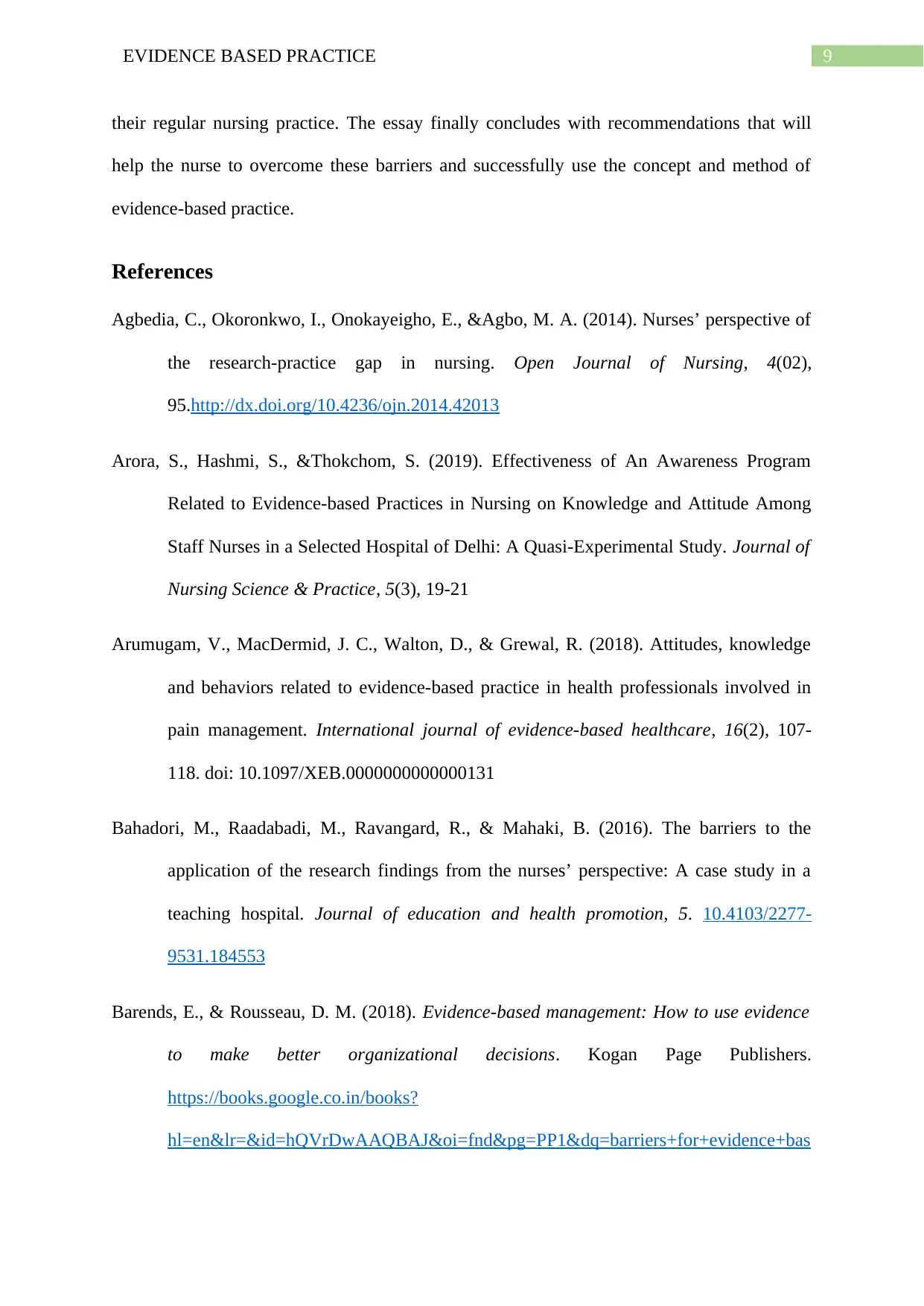
9EVIDENCE BASED PRACTICE
their regular nursing practice. The essay finally concludes with recommendations that will
help the nurse to overcome these barriers and successfully use the concept and method of
evidence-based practice.
References
Agbedia, C., Okoronkwo, I., Onokayeigho, E., &Agbo, M. A. (2014). Nurses’ perspective of
the research-practice gap in nursing. Open Journal of Nursing, 4(02),
95.http://dx.doi.org/10.4236/ojn.2014.42013
Arora, S., Hashmi, S., &Thokchom, S. (2019). Effectiveness of An Awareness Program
Related to Evidence-based Practices in Nursing on Knowledge and Attitude Among
Staff Nurses in a Selected Hospital of Delhi: A Quasi-Experimental Study. Journal of
Nursing Science & Practice, 5(3), 19-21
Arumugam, V., MacDermid, J. C., Walton, D., & Grewal, R. (2018). Attitudes, knowledge
and behaviors related to evidence-based practice in health professionals involved in
pain management. International journal of evidence-based healthcare, 16(2), 107-
118. doi: 10.1097/XEB.0000000000000131
Bahadori, M., Raadabadi, M., Ravangard, R., & Mahaki, B. (2016). The barriers to the
application of the research findings from the nurses’ perspective: A case study in a
teaching hospital. Journal of education and health promotion, 5. 10.4103/2277-
9531.184553
Barends, E., & Rousseau, D. M. (2018). Evidence-based management: How to use evidence
to make better organizational decisions. Kogan Page Publishers.
https://books.google.co.in/books?
hl=en&lr=&id=hQVrDwAAQBAJ&oi=fnd&pg=PP1&dq=barriers+for+evidence+bas
their regular nursing practice. The essay finally concludes with recommendations that will
help the nurse to overcome these barriers and successfully use the concept and method of
evidence-based practice.
References
Agbedia, C., Okoronkwo, I., Onokayeigho, E., &Agbo, M. A. (2014). Nurses’ perspective of
the research-practice gap in nursing. Open Journal of Nursing, 4(02),
95.http://dx.doi.org/10.4236/ojn.2014.42013
Arora, S., Hashmi, S., &Thokchom, S. (2019). Effectiveness of An Awareness Program
Related to Evidence-based Practices in Nursing on Knowledge and Attitude Among
Staff Nurses in a Selected Hospital of Delhi: A Quasi-Experimental Study. Journal of
Nursing Science & Practice, 5(3), 19-21
Arumugam, V., MacDermid, J. C., Walton, D., & Grewal, R. (2018). Attitudes, knowledge
and behaviors related to evidence-based practice in health professionals involved in
pain management. International journal of evidence-based healthcare, 16(2), 107-
118. doi: 10.1097/XEB.0000000000000131
Bahadori, M., Raadabadi, M., Ravangard, R., & Mahaki, B. (2016). The barriers to the
application of the research findings from the nurses’ perspective: A case study in a
teaching hospital. Journal of education and health promotion, 5. 10.4103/2277-
9531.184553
Barends, E., & Rousseau, D. M. (2018). Evidence-based management: How to use evidence
to make better organizational decisions. Kogan Page Publishers.
https://books.google.co.in/books?
hl=en&lr=&id=hQVrDwAAQBAJ&oi=fnd&pg=PP1&dq=barriers+for+evidence+bas
Paraphrase This Document
Need a fresh take? Get an instant paraphrase of this document with our AI Paraphraser
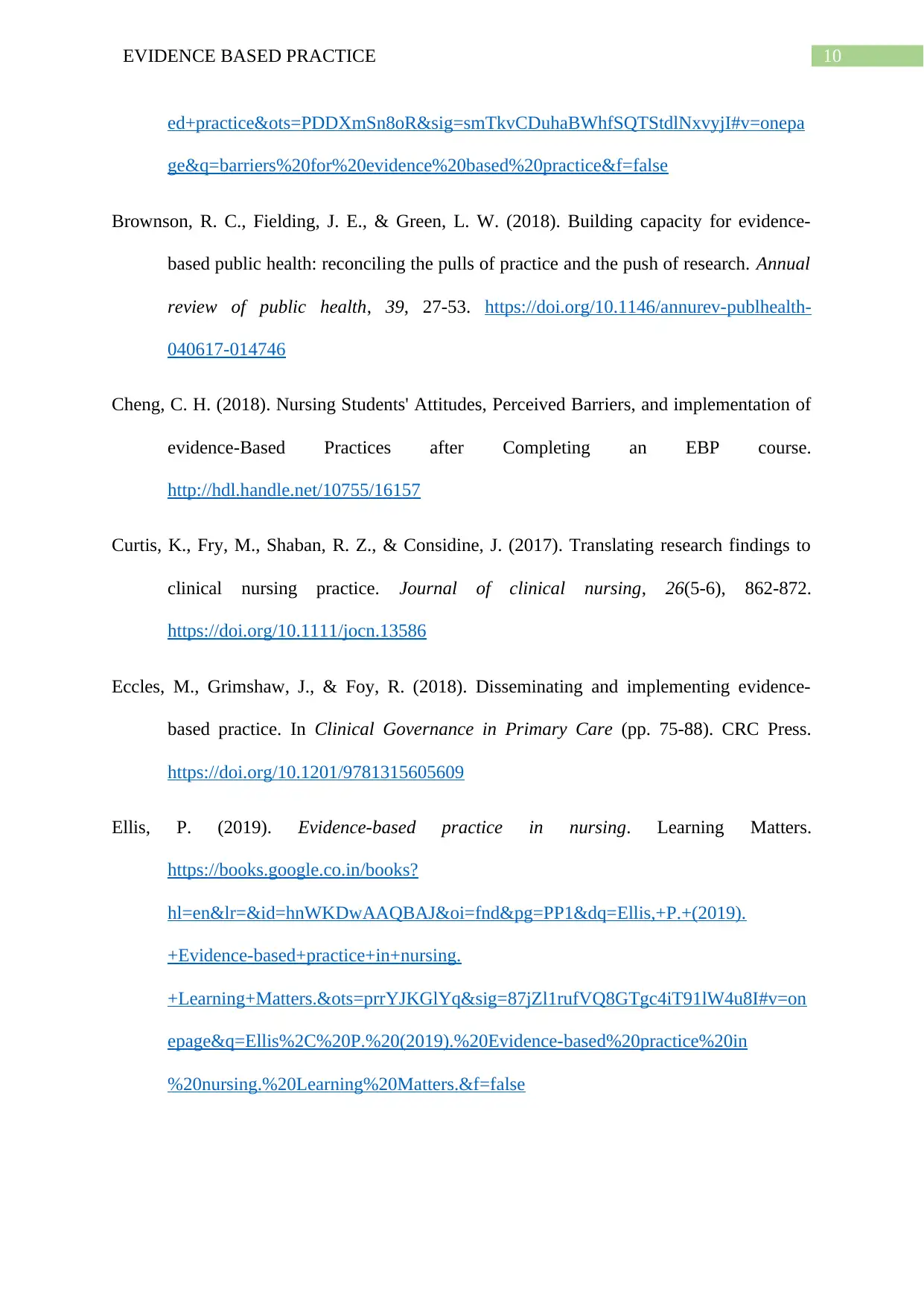
10EVIDENCE BASED PRACTICE
ed+practice&ots=PDDXmSn8oR&sig=smTkvCDuhaBWhfSQTStdlNxvyjI#v=onepa
ge&q=barriers%20for%20evidence%20based%20practice&f=false
Brownson, R. C., Fielding, J. E., & Green, L. W. (2018). Building capacity for evidence-
based public health: reconciling the pulls of practice and the push of research. Annual
review of public health, 39, 27-53. https://doi.org/10.1146/annurev-publhealth-
040617-014746
Cheng, C. H. (2018). Nursing Students' Attitudes, Perceived Barriers, and implementation of
evidence-Based Practices after Completing an EBP course.
http://hdl.handle.net/10755/16157
Curtis, K., Fry, M., Shaban, R. Z., & Considine, J. (2017). Translating research findings to
clinical nursing practice. Journal of clinical nursing, 26(5-6), 862-872.
https://doi.org/10.1111/jocn.13586
Eccles, M., Grimshaw, J., & Foy, R. (2018). Disseminating and implementing evidence-
based practice. In Clinical Governance in Primary Care (pp. 75-88). CRC Press.
https://doi.org/10.1201/9781315605609
Ellis, P. (2019). Evidence-based practice in nursing. Learning Matters.
https://books.google.co.in/books?
hl=en&lr=&id=hnWKDwAAQBAJ&oi=fnd&pg=PP1&dq=Ellis,+P.+(2019).
+Evidence-based+practice+in+nursing.
+Learning+Matters.&ots=prrYJKGlYq&sig=87jZl1rufVQ8GTgc4iT91lW4u8I#v=on
epage&q=Ellis%2C%20P.%20(2019).%20Evidence-based%20practice%20in
%20nursing.%20Learning%20Matters.&f=false
ed+practice&ots=PDDXmSn8oR&sig=smTkvCDuhaBWhfSQTStdlNxvyjI#v=onepa
ge&q=barriers%20for%20evidence%20based%20practice&f=false
Brownson, R. C., Fielding, J. E., & Green, L. W. (2018). Building capacity for evidence-
based public health: reconciling the pulls of practice and the push of research. Annual
review of public health, 39, 27-53. https://doi.org/10.1146/annurev-publhealth-
040617-014746
Cheng, C. H. (2018). Nursing Students' Attitudes, Perceived Barriers, and implementation of
evidence-Based Practices after Completing an EBP course.
http://hdl.handle.net/10755/16157
Curtis, K., Fry, M., Shaban, R. Z., & Considine, J. (2017). Translating research findings to
clinical nursing practice. Journal of clinical nursing, 26(5-6), 862-872.
https://doi.org/10.1111/jocn.13586
Eccles, M., Grimshaw, J., & Foy, R. (2018). Disseminating and implementing evidence-
based practice. In Clinical Governance in Primary Care (pp. 75-88). CRC Press.
https://doi.org/10.1201/9781315605609
Ellis, P. (2019). Evidence-based practice in nursing. Learning Matters.
https://books.google.co.in/books?
hl=en&lr=&id=hnWKDwAAQBAJ&oi=fnd&pg=PP1&dq=Ellis,+P.+(2019).
+Evidence-based+practice+in+nursing.
+Learning+Matters.&ots=prrYJKGlYq&sig=87jZl1rufVQ8GTgc4iT91lW4u8I#v=on
epage&q=Ellis%2C%20P.%20(2019).%20Evidence-based%20practice%20in
%20nursing.%20Learning%20Matters.&f=false
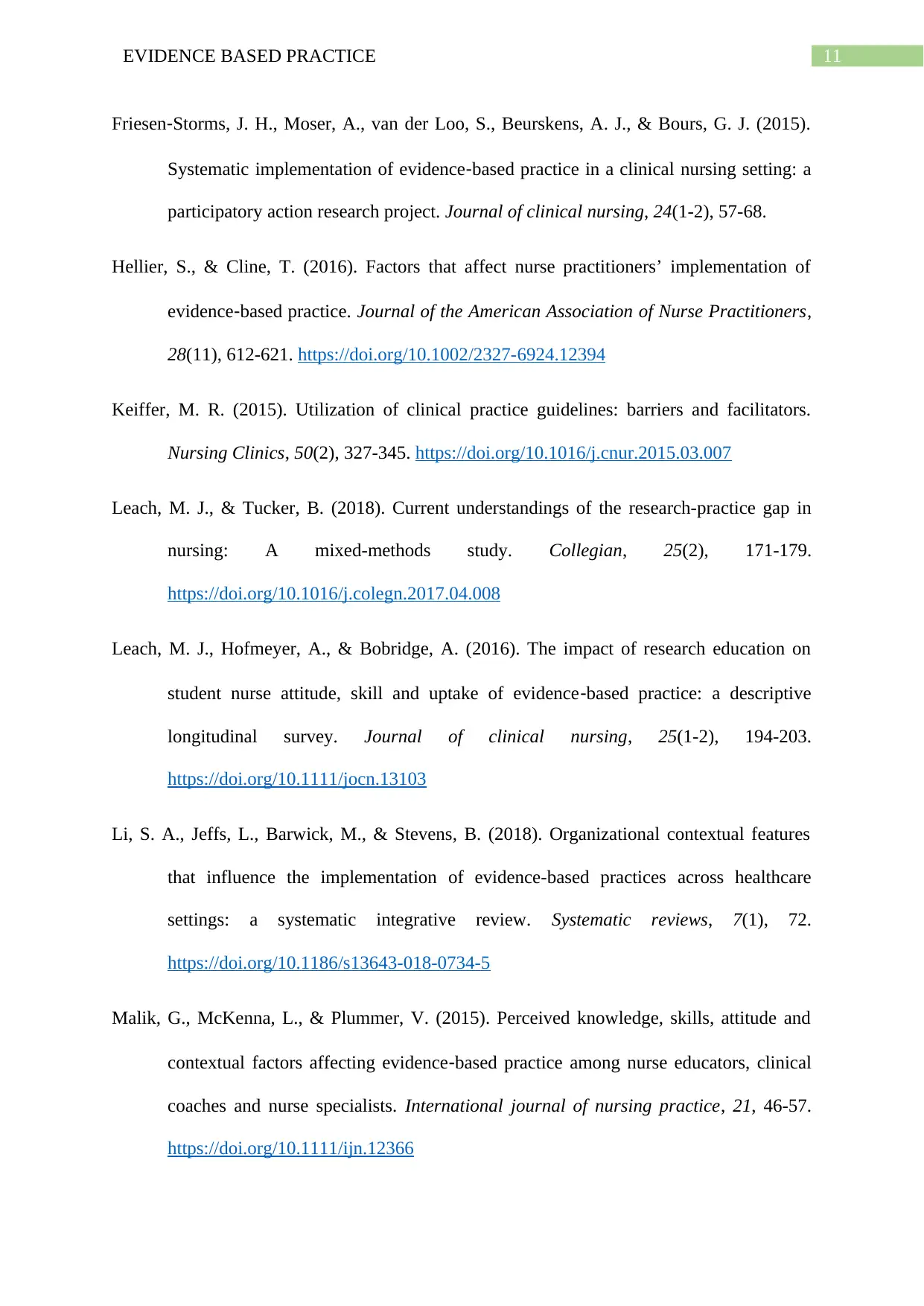
11EVIDENCE BASED PRACTICE
Friesen‐Storms, J. H., Moser, A., van der Loo, S., Beurskens, A. J., & Bours, G. J. (2015).
Systematic implementation of evidence‐based practice in a clinical nursing setting: a
participatory action research project. Journal of clinical nursing, 24(1-2), 57-68.
Hellier, S., & Cline, T. (2016). Factors that affect nurse practitioners’ implementation of
evidence‐based practice. Journal of the American Association of Nurse Practitioners,
28(11), 612-621. https://doi.org/10.1002/2327-6924.12394
Keiffer, M. R. (2015). Utilization of clinical practice guidelines: barriers and facilitators.
Nursing Clinics, 50(2), 327-345. https://doi.org/10.1016/j.cnur.2015.03.007
Leach, M. J., & Tucker, B. (2018). Current understandings of the research-practice gap in
nursing: A mixed-methods study. Collegian, 25(2), 171-179.
https://doi.org/10.1016/j.colegn.2017.04.008
Leach, M. J., Hofmeyer, A., & Bobridge, A. (2016). The impact of research education on
student nurse attitude, skill and uptake of evidence‐based practice: a descriptive
longitudinal survey. Journal of clinical nursing, 25(1-2), 194-203.
https://doi.org/10.1111/jocn.13103
Li, S. A., Jeffs, L., Barwick, M., & Stevens, B. (2018). Organizational contextual features
that influence the implementation of evidence-based practices across healthcare
settings: a systematic integrative review. Systematic reviews, 7(1), 72.
https://doi.org/10.1186/s13643-018-0734-5
Malik, G., McKenna, L., & Plummer, V. (2015). Perceived knowledge, skills, attitude and
contextual factors affecting evidence‐based practice among nurse educators, clinical
coaches and nurse specialists. International journal of nursing practice, 21, 46-57.
https://doi.org/10.1111/ijn.12366
Friesen‐Storms, J. H., Moser, A., van der Loo, S., Beurskens, A. J., & Bours, G. J. (2015).
Systematic implementation of evidence‐based practice in a clinical nursing setting: a
participatory action research project. Journal of clinical nursing, 24(1-2), 57-68.
Hellier, S., & Cline, T. (2016). Factors that affect nurse practitioners’ implementation of
evidence‐based practice. Journal of the American Association of Nurse Practitioners,
28(11), 612-621. https://doi.org/10.1002/2327-6924.12394
Keiffer, M. R. (2015). Utilization of clinical practice guidelines: barriers and facilitators.
Nursing Clinics, 50(2), 327-345. https://doi.org/10.1016/j.cnur.2015.03.007
Leach, M. J., & Tucker, B. (2018). Current understandings of the research-practice gap in
nursing: A mixed-methods study. Collegian, 25(2), 171-179.
https://doi.org/10.1016/j.colegn.2017.04.008
Leach, M. J., Hofmeyer, A., & Bobridge, A. (2016). The impact of research education on
student nurse attitude, skill and uptake of evidence‐based practice: a descriptive
longitudinal survey. Journal of clinical nursing, 25(1-2), 194-203.
https://doi.org/10.1111/jocn.13103
Li, S. A., Jeffs, L., Barwick, M., & Stevens, B. (2018). Organizational contextual features
that influence the implementation of evidence-based practices across healthcare
settings: a systematic integrative review. Systematic reviews, 7(1), 72.
https://doi.org/10.1186/s13643-018-0734-5
Malik, G., McKenna, L., & Plummer, V. (2015). Perceived knowledge, skills, attitude and
contextual factors affecting evidence‐based practice among nurse educators, clinical
coaches and nurse specialists. International journal of nursing practice, 21, 46-57.
https://doi.org/10.1111/ijn.12366
⊘ This is a preview!⊘
Do you want full access?
Subscribe today to unlock all pages.

Trusted by 1+ million students worldwide
1 out of 15
Related Documents
Your All-in-One AI-Powered Toolkit for Academic Success.
+13062052269
info@desklib.com
Available 24*7 on WhatsApp / Email
![[object Object]](/_next/static/media/star-bottom.7253800d.svg)
Unlock your academic potential
Copyright © 2020–2025 A2Z Services. All Rights Reserved. Developed and managed by ZUCOL.





